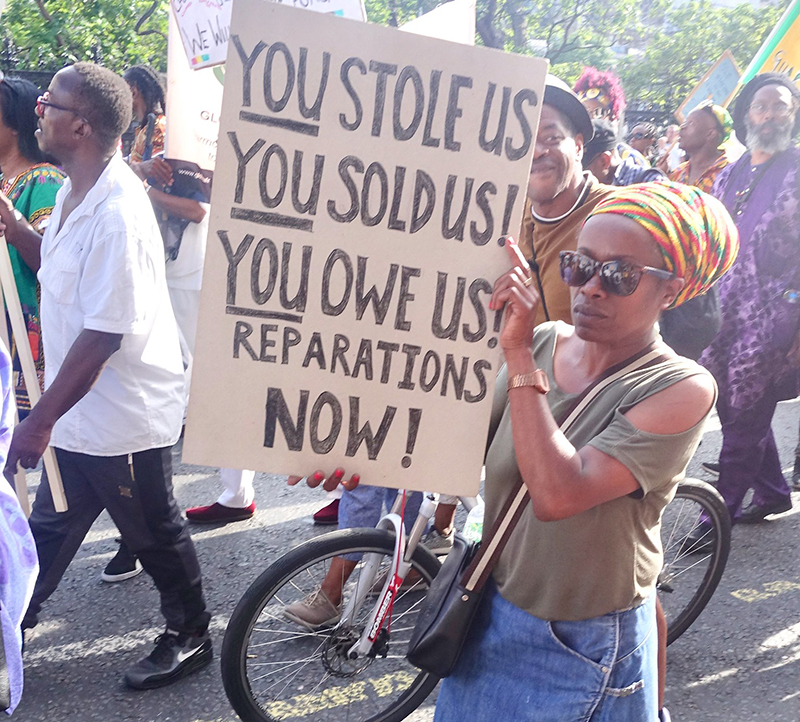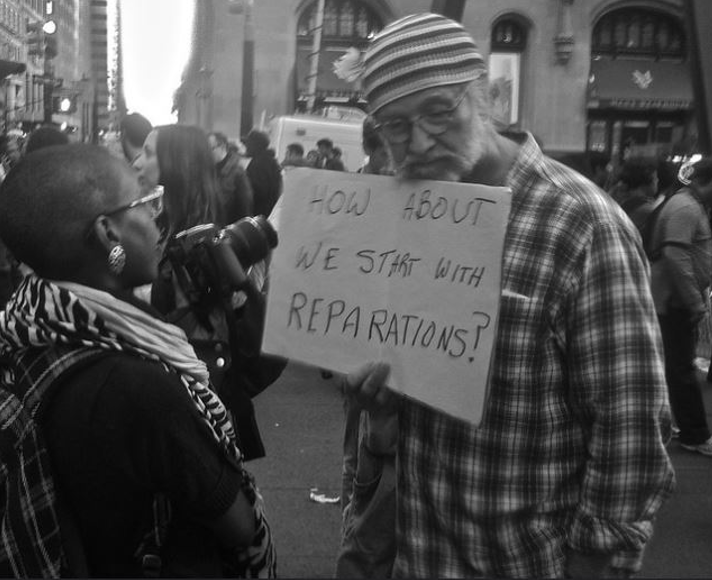What are reparations?
The transatlantic trafficking of enslaved Africans was an incalculable atrocity and an irreparable crime. The afterlife of such atrocity raises questions as to how best to reckon with the crimes against humanity while at the same time establishing a roadmap to ensure justice and healing for those affected. Such a process has come to be dealt with through the field of transitional and transformative justice. Central to this are the ways in which serious human rights violations can be addressed in order to ensure accountability, justice for survivors and nonrecurrence.
In short, transitional and transformative justice deal with the past while also having a long-term aim of creating conditions of justice for the present and the future. To achieve these aims, four main pillars have emerged: criminal prosecutions, truth-seeking, reparations and reform. Specifically, The Repair Campaign is centred around amplifying the call for reparations as laid out in CARICOM’s Ten Point Plan.
But what exactly are reparations?
Reparations describe how an individual, group or society attempts to rectify and remedy wrong-doing, crime or atrocity. In other words, reparations are an attempt to “repair” the harm done. Crucially, reparations “must be understood as a right and not a favour.”¹ Reparations can largely be grouped into two broad categories, namely, symbolic reparations and financial or material reparations. These can include – but are not limited to – formal apologies; return of colonised land and artefacts; direct payment; restitution of civil rights; and processes of memorialisation.
Overall, reparations aim to provide:
-
- Restitution (restore conditions to original situation before violation)
-
- Compensation (provide for economic loss)
-
- Rehabilitation (relating to medical, social, legal and psychological care)
-
- Satisfaction (including truth-seeking, commemoration, apology and nonrecurrence)
It is important to emphasise financial remuneration is only one type of reparation. Certainly, monetary compensation alone is not enough and reparations should not be reduced or equated to this. That being said, it must be included in the toolbox of measures, especially given the drastic present-day socioeconomic inequalities faced due to past atrocities.
And how does this relate to the Caribbean?
Considering the legacy of chattel enslavement, colonisation and genocide, it comes as no surprise that the wider problem of social neglect is a common theme throughout the Caribbean region with communities struggling with deteriorating socioeconomic conditions such as unemployment, public health crises, lack of access to education and heightened vulnerabilities to climate change.
With this in mind, The Repair Campaign is supporting the reparatory justice process to assess the damage caused (including continued damage) socially, economically, psychologically and emotionally while also offering avenues and areas for redress, rehabilitation and healing. This approach, informed by the work of Sir Hilary Beckles and other scholars on the topic, believes enhancing socioeconomic justice and equitable distribution of resources is central to reparations in the Caribbean. The Repair Campaign is also guided by the Caribbean Reparations Commission’s 2014 Ten Point Plan for Reparatory Justice.
An action plan that outlines the decolonised, transformative path to justice, reconciliation and truth. To be sure, reparations are a sensitive area and will not always be acceptable to everyone, especially on a large societal-wide scale. One person’s version of reparations will differ depending on many contextually relevant factors. In any case, the descendants of those affected by chattel slavery must be at the centre of any design and implementation of reparations. That is why an emphasis on grassroots involvement and community-led processes can make the initiatives as inclusive and representative as possible. What’s more, integrating education as well as music, art and literature should also be considered to create an intergenerational and cross-community approach.
Are there global examples to look to?
There are many examples of justice-seeking in various capacities across the world and there is no one-size-fits-all blueprint. It is, however, worth examining how countries, organisations, companies, universities, institutions and even families can consider or enact reparations in order to glean possible learnings.
According to the UN Human Rights Office, no state “has fully reckoned with the past or comprehensively accounted for the impacts of the lives of people of African descent today.” Certain global powers such as the UK are notably evasive on the topic of reparations and questions abound as to how financial reparations should be given and how much. Regardless, reparations are being pursued in many forms to address the way chattel slavery, colonisation and racism have negatively impacted people of African descent.
While statements of apology are becoming slightly more common, financial reparations are less so. Germany compensating Holocaust survivors under the Luxembourg Agreements offers the closest example, but there are other cases which you can read more about in our future articles.
Sources and further reading:
Cheryl Lawther et al (eds): Research Handbook on Transitional Justice.
Duncan Light et al: Transitional Justice and the Political ‘Work’ of Domestic Tourism.
International Center for Transitional Justice.
M. Brinton Lykes and Hugo van der Merwe: Exploring/Expanding the Reach of Transitional Justice.
OHCHR: Reparations, OHCHR and Transitional Justice.
Roger Duthie: Toward a Development-Sensitive Approach to Transitional Justice.
Footnotes:
1. Quote by Professor Denis Bikesha, law professor at the University of Rwanda via JusticeInfo.net.


